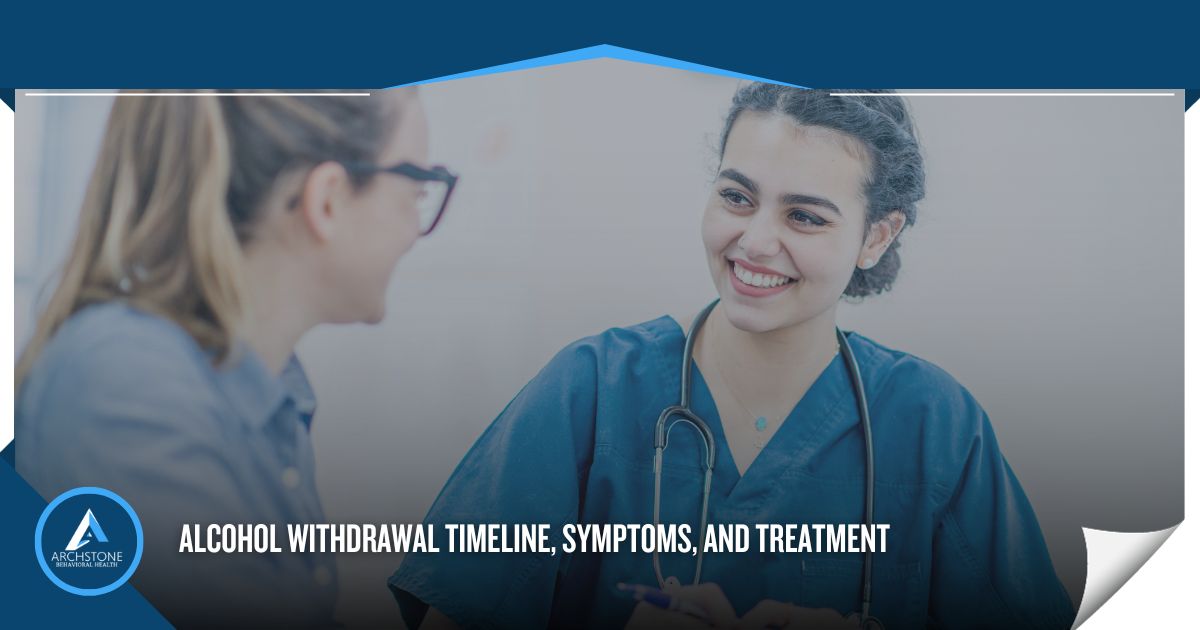Alcohol Withdrawal Timeline, Symptoms, and Treatment
Get Help Now
Alcohol is widely available in the United States’ culture. While many people maintain a healthy relationship with alcohol, some struggle with alcohol abuse or addiction.
There are many ways alcohol abuse and addiction may develop. Someone may begin drinking socially and come to depend on it, and others might become addicted to alcohol after using it to self-medicate emotional or physical pain.
Regardless of the beginning of an alcohol addiction, comprehensive treatment offers hope for a healthier, sober future. The road to recovery may not always be easy, but the journey can lead to a happier and more fulfilling life.
Before beginning treatment, learning as much as possible about the process is essential. For many, treatment will start with care in a medically-supported detox program. This article will explore what happens in an alcohol detox program, the alcohol withdrawal timeline, and what symptoms you can expect at each stage of withdrawal.
Reach out to the Archstone Recovery team now to learn about our comprehensive, high-quality alcohol addiction treatment programs or for support during any stage of your recovery from addiction.
How Alcohol Affects Your Body
After you drink alcohol, you’re likely to experience various effects. People may become sleepy, slur their words, have impaired judgment, or lose coordination. Alcohol works in the body by reducing activity in the central nervous system (CNS), resulting in a feeling of relaxation or drowsiness.
To compensate for this decrease in activity, the CNS works to counteract the effects by increasing its activity. After a period of ongoing or heavy alcohol use, the CNS stays in this heightened activity state. This is one symptom of physical dependence.
When someone stops drinking alcohol, the CNS continues to be overly active. Without the depressant effects of alcohol, people are likely to experience a range of physical and emotional symptoms–and some can be dangerous or life-threatening. These symptoms are part of a condition called alcohol withdrawal.
Understanding the Alcohol Withdrawal Timeline
While many factors can affect how your body manages alcohol withdrawal, this process generally has four stages.
Stage 1: 6-12 hours after your last drink
This stage often includes many uncomfortable physical symptoms, including:
- Anxiety
- Sweating
- Headache
- Insomnia
- Tremors/shaking
- Nausea, vomiting, and upset stomach
Cravings for alcohol may be intense during this stage. Many people require physical treatment and support to avoid relapse during the first stage of alcohol withdrawal.
Stage 2: 12-24 hours after your last drink
Sweating and vomiting may cause dehydration, and it may feel impossible to eat or drink. Some people may experience upsetting hallucinations during this stage.
Stage 3: 24-48 hours after your last drink
Irritability and low blood sugar are common symptoms during the third stage of alcohol withdrawal. During this stage, people may develop a dangerous condition called delirium tremens. The symptoms of delirium tremens include:
- Overheating
- Excessive sweating
- Hallucinations
- Extreme confusion
- Seizures
In some cases, delirium tremens can be fatal. While certain risk factors make it more likely someone will develop delirium tremens, it can happen to anyone in alcohol withdrawal.
Stage 4: 48-168 hours after your last drink
After two full days without consuming alcohol, physical symptoms may decrease slightly. Many people experience increasing emotional symptoms at this stage, including depression, anxiety, confusion, irritability, and agitation.
Some factors can influence the duration and severity of your alcohol withdrawal timeline. These include:
- The severity of your alcohol use
- Gender
- Your physical and mental health
- Family history of substance abuse
- Other substances you used while drinking
Comprehensive care can help you have the safest and most comfortable alcohol detox possible.
Detox at Each Stage of the Alcohol Withdrawal Timeline
During medically supervised detox, you will receive the support and treatment you need to manage the withdrawal period safely. Alcohol detox programs typically have three stages.
Assessment
Before beginning treatment, you will undergo an assessment to identify any mental or physical health conditions that could affect alcohol withdrawal. Doctors and other specialists will determine if medications are necessary and whether you require inpatient or outpatient treatment.
Stabilization
As your body begins to detox, you will receive treatment to keep you safe and more comfortable. You may take medications that help reduce cravings and other withdrawal symptoms, as well as round-the-clock emotional support and monitoring. A benzodiazepine taper is typically used during alcohol withdrawal to prevent seizures, calm anxiety, and promote restfulness.
Rehabilitation
You will participate in a program to help you identify and overcome the complex roots of your alcohol misuse and addiction. Your treatment plan will likely include evidence-based therapies like behavioral counseling, group therapy, and education. You may also have access to nutrition support, mindfulness training, massage, yoga, and other holistic treatments to support your whole-person recovery from addiction.
Find an Alcohol Detox
If you or someone you love requires treatment for alcohol addiction, reach out to the Archstone Recovery specialists today to learn about our holistic approach to alcohol rehab. Don’t wait another day to get the help and support you need. Contact us today to begin your recovery journey.
References:
- National Library of Medicine: Alcoholism and its effects on the central nervous system, Retrieved October 2023 from https://pubmed.ncbi.nlm.nih.gov/23713737/
- National Library of Medicine: Alcohol withdrawal syndrome: mechanisms, manifestations, and management, Retrieved October 2023 from https://www.ncbi.nlm.nih.gov/pmc/articles/PMC6084325/
- National Library of Medicine: Alcohol Withdrawal Syndrome: Benzodiazepines and Beyond, Retrieved October 2023 from https://www.ncbi.nlm.nih.gov/pmc/articles/PMC4606320/
